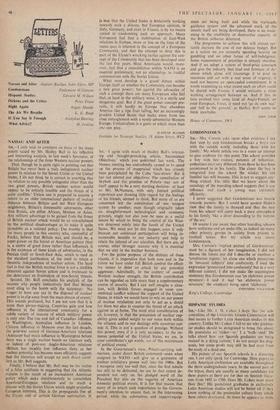SIR,— I agree with much of Fledley Bull's interest- ing
and thought-provoking article, 'Inconsistent Objectives,' which you published last week. The Nassau meeting has undoubtedly caused us to speed up the process of reappraisal which has already been precipitated by the Cuba lace-down.' But it has not altered our objectives. The cancellation of Skybolt and the promise of Polaris may not of itself appear to be a very startling decision---at least so Mr. McNamara, with only limited political experience and showing little regard for the feelings of his friends, seemed to think. But many of us are concerned lest the substitution of one weapon system by another, even though originally taken on straightforward technological and economic grounds, might not also now be seen as a useful means by which to bring the control of the West- ern deterrent solely into the hands of the United States. We must not let this happen, even if only because our continued participation will bring in- numerable benefits to our industry and help to retain the interest of our scientists. But there are, of course, other stronger reasons why it is essential that we stay in the nuclear business.
For the prime purpose of the defence of these islands, it is imperative that both now and in the • future we have under full British control the effect- ive means to deter an attack by any potential aggressor. Admittedly, in the context of overall Western nuclear strength, the British contribution can be regarded as little more than a -supplementary source of security. But I can well imagine a situa- tion, with British forces engaged in some con- ventional conflict without the support of the United States, in which we would have to rely on our power of nuclear retaliation not only to act as a shield for them but also to counter the threat of an attack against us at home. The most vital consideration of all, however, is that the possession of nuclear cap- ability -gives added weight to our voice both within the alliance and in our dealings with countries out- side it. This is not a question of prestige. Without this power, even if it is only secondary to the im- mense potential of the United States, we are, in your contributor's apt words, out of 'the mainstream of political events.'
In the Government's view, Polaris-carrying sub- marines, under direct British command—even when assigned to NATO—will give us a guarantee of nuclear retaliatory power well into the 1980s. But 1 recognise only too well that, since the first missile has still to be delivered, we are to that extent de- pendent not only on the pledged word of the President but also on the vagaries of American domestic political events. It is for that reason that many of us attach such importance to the Govern- ment's intention to ensure that, in the intervening period, while the submarines and support-equip- meat are being built and while the warheads, guidance system and the advanced mark of the missile itself are being developed, there is no weak- ening in the credibility or destructive capacity of the British airborne deterrent.
The programme to achieve this will almost cer- tainly increase the cost of our defence budget. But as a nation we are currently spending heavily on gambling and on other forms of self-indulgence. Some reassessment of priorities is already overdue. And if we adept a system of fixed-price contracts and give the industry that lead and firmness of de- cision which alone will encourage it to pool its resources and act with a real sense of urgency, it need not become an open-ended commitment. It is worth examining to what extent such an effort could be shared with France. I would welcome a close working arrangement between us. And if this in turn evolved into some kind of Anglo-French, or even European, Force, it need not 'go its own way' and 'fall to the ground.' as Hedley Bull seems to think inevitable.
)(MIN I N






























 Previous page
Previous page